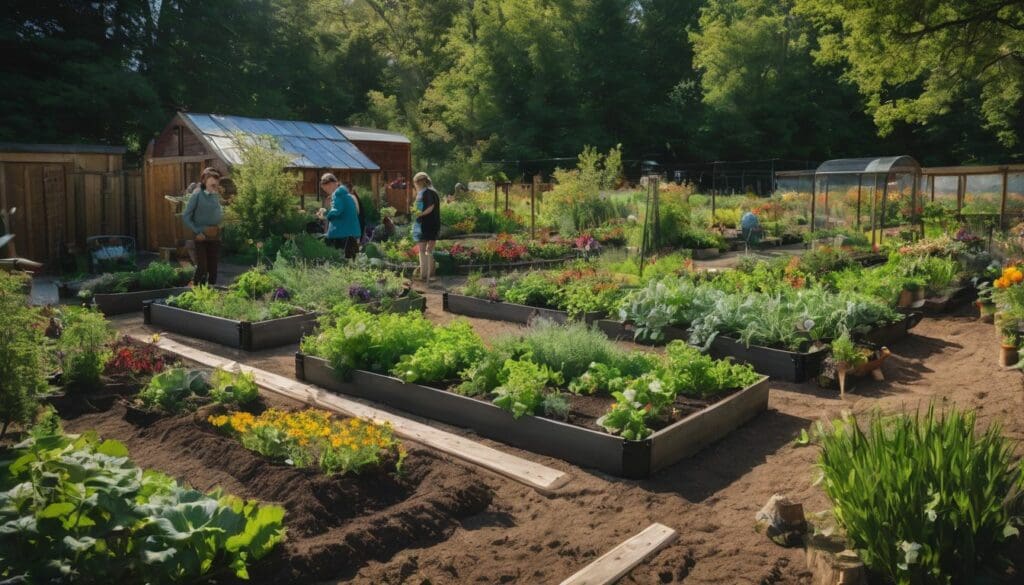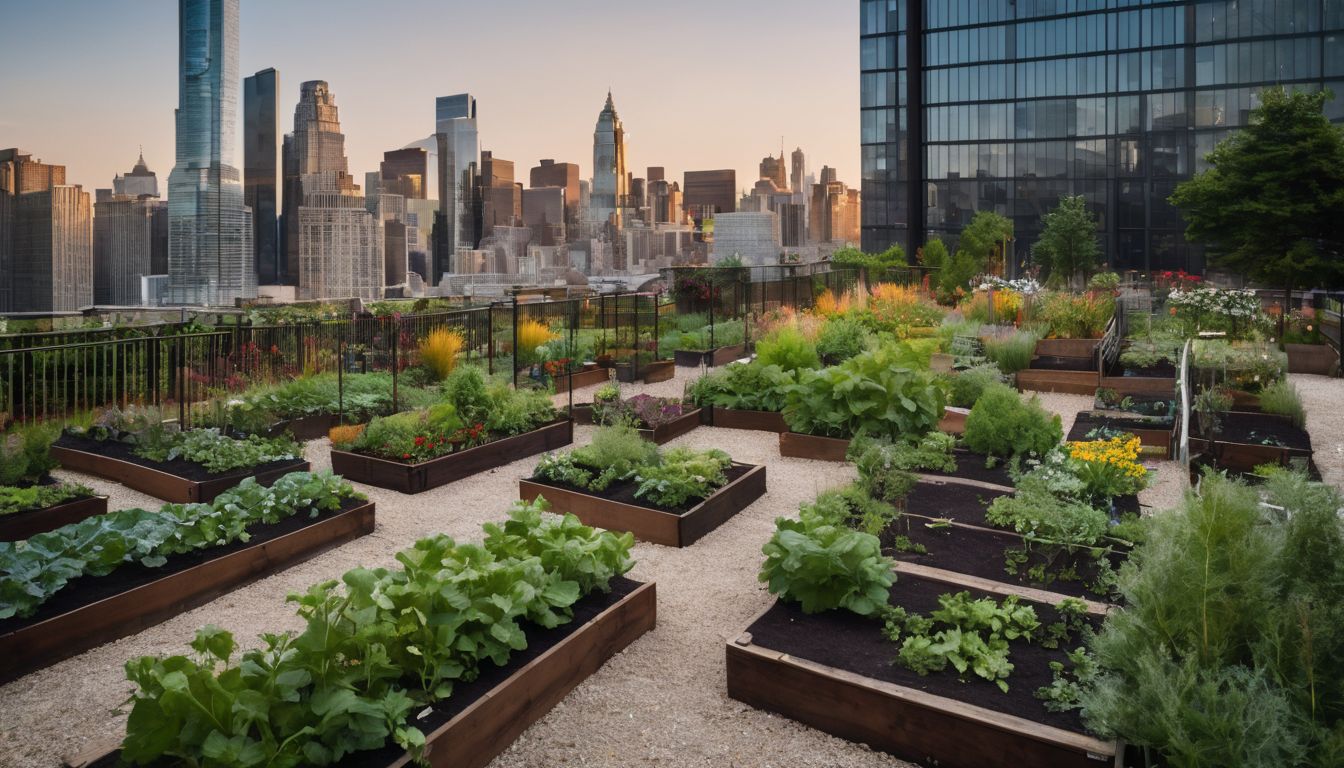Gardens are struggling to beat the heat, and water is getting scarce. Community workshops can turn your thumbs green and your garden eco-friendly. Our blog guides you through setting up these workshops to grow lush, yet sustainable gardens.
Let’s dig in!
Key Takeaways
- Community workshops teach sustainable gardening, like using native plants and composting, to help the environment and wildlife.
- Engaging schools and local groups in eco – friendly gardening creates a united community that cares for nature.
- Workshops offer practical skills such as conserving water with drought – resistant plants and smart irrigation techniques.
- Partnering with experts brings valuable knowledge to the workshops, ensuring they’re informative and effective.
- Flexible online classes allow more people to learn about eco – friendly practices at their own pace.
The Role of Community Workshops in Promoting Eco-Friendly Gardening
Community workshops play a vital role in promoting eco-friendly gardening by educating individuals on natural living practices, fostering community involvement and encouraging sustainable gardening techniques.
These workshops empower individuals to make a positive impact on the environment through their gardening practices.
Educating individuals on natural living practices
Teaching people about natural living practices can make a powerful impact on the environment. Workshops offer hands-on experience with sustainable gardening, showing participants how to grow their own food using organic methods.
They learn to nurture the soil and conserve water through smart irrigation techniques. These lessons emphasise biodiversity by integrating native plants that attract pollinators and support local wildlife.
Practical skills such as composting turn kitchen waste into valuable nutrients for gardens instead of adding to landfill sites. Sustainable landscape design classes inspire attendees to create eco-friendly spaces in their urban or suburban homes.
By embracing these practices, individuals not only contribute to environmental conservation but also enjoy the wellness benefits of connecting with nature.
Fostering community involvement
Engaging the community in eco-friendly gardening workshops creates a sense of shared responsibility for environmental stewardship. By involving local residents in organic gardening classes and sustainable living practices, we encourage active participation in conserving natural resources and preserving biodiversity.
Through these events, individuals have the opportunity to contribute to their community’s well-being while learning about urban agriculture programs, conservation education, and green living initiatives.
By fostering community involvement in ecological gardening workshops, we build a network of like-minded individuals dedicated to promoting environmentally friendly practices. This collaboration cultivates a supportive environment where everyone can share ideas, learn from each other’s experiences, and work together towards creating more sustainable communities through eco-friendly gardening engagement.
Encouraging sustainable gardening techniques
Emphasise using organic fertilisers and natural pest control methods. Introduce native plants to promote biodiversity in gardens, which can attract pollinators and benefit local wildlife.
Teach about drought-tolerant plants and sustainable irrigation techniques to conserve water resources. Encourage the use of composting to improve soil health and reduce waste.
Transitioning into a more eco-friendly approach often begins with small changes that collectively make a big impact on the environment. The next step involves exploring effective strategies for organising successful community workshops on eco-friendly gardening.
Benefits of Community Workshops for Eco-Friendly Gardening
Empowering individuals to grow their own food and reducing water consumption are just a few of the benefits that come from participating in eco-friendly gardening workshops. These workshops also focus on improving soil health, leading to a healthier environment overall.
Empowering individuals to grow their own food
Empowering individuals to cultivate their own nourishment fosters self-sufficiency and reduces reliance on commercial food sources. Growing food at home promotes healthy eating while lowering carbon footprints, contributing to a more sustainable environment.
Utilising drought-tolerant plants, native species, and organic gardening techniques can help individuals take control of their food supply, making a positive impact on both personal health and the planet.
Providing knowledge and resources for growing one’s own food not only empowers individuals but also strengthens communities through shared skills and values. As people become more self-reliant in producing their sustenance, they contribute to a healthier ecosystem while creating opportunities for communal bonding over mutual interests such as eco-friendly gardening practices.
Reducing water consumption
Eco-friendly gardening workshops offer valuable strategies for reducing water consumption. Participants learn about drought-tolerant plants and sustainable irrigation methods, helping them make informed choices in their gardens.
These workshops provide practical techniques such as rainwater harvesting and drip irrigation systems to conserve water while maintaining healthy gardens. By implementing these practices, individuals can contribute to the preservation of natural resources and support environmental sustainability.
Participants in eco-friendly gardening events gain knowledge about using native plants that require less water, enhancing garden biodiversity while conserving this precious resource.
Improving soil health
Enhance your gardening game by focusing on improving soil health. Healthy, nutrient-rich soil is vital for thriving plants and a sustainable garden. Implementing composting techniques enriches the soil with essential nutrients, promoting plant growth while reducing waste.
Incorporating organic matter such as leaves, grass clippings, and kitchen scraps enhances soil structure and fertility. By fostering biodiversity in your garden through native plant gardens and permaculture practices, you can naturally improve the health of your soil.
Boosting the microbial activity in the soil further contributes to its overall well-being. Utilising natural fertilisers like compost tea or manure encourages beneficial microorganisms that help break down organic matter into nutrients accessible to plants.
Effective Strategies for Organising a Successful Community Workshop
Partner with local experts and organisations to provide a diverse range of expertise, utilise online platforms for easy registration and promotion, and offer hands-on activities to engage participants.
Read on to learn more about how these strategies can help foster successful eco-friendly gardening workshops in your community.
Partnering with local experts and organisations
Teaming up with local environmental experts and organisations allows us to tap into their knowledge, experience, and resources. By collaborating on sustainable gardening workshops, we gain valuable insights that enhance the quality and relevance of our educational sessions.
This partnership fosters a sense of community and strengthens our collective impact in promoting eco-friendly gardening practices. Working together with local experts enriches the workshops with diverse perspectives, innovative ideas, and practical guidance.
Engaging with respected environmental organisations enables us to amplify our outreach efforts by tapping into their existing networks and community connections. Leveraging these partnerships expands the reach of our eco-friendly gardening events, attracting a wider audience who can benefit from the valuable information shared during the workshops.
Utilising online platforms for registration and promotion
Engage with our eco-friendly gardening community by leveraging online platforms for convenient registration and widespread promotion. Registering for workshops and events can be done effortlessly through our user-friendly website, providing easy access to information about upcoming opportunities.
By utilising social media channels and email newsletters, we can effectively reach a broader audience, spreading the word about our initiatives and encouraging active participation from environmentally conscious individuals seeking to enhance their knowledge in sustainable gardening practices.
Harness the power of digital tools to efficiently manage workshop registrations while expanding our reach within the community. Social media shares and online event listings will enable us to create a buzz around eco-friendly gardening workshops, attracting those eager to contribute towards conservation efforts through hands-on learning experiences.
Offering a variety of topics and hands-on activities
Engage participants with diverse topics and hands-on activities, catering to various interests and skill levels.
- Incorporate sessions on using native plants to attract pollinators and support local wildlife, promoting biodiversity in gardening.
- Demonstrate composting and organic gardening techniques, empowering attendees to implement sustainable practices in their own gardens.
- Provide workshops on sustainable irrigation methods, enabling individuals to reduce water consumption while maintaining healthy plants.
- Offer engaging discussions on edible gardening, educating participants about growing their own food and the benefits of consuming locally grown produce.
Topics for Eco-Friendly Gardening Workshops
Explore the use of native plants to support local wildlife, learn about composting and organic gardening techniques, and discover sustainable irrigation methods for a more environmentally-friendly garden.
Join us in our upcoming workshops to delve deeper into these topics and kickstart your eco-friendly gardening journey today!
Using native plants to support pollinators and wildlife
Planting native species in your garden creates a thriving ecosystem for pollinators and wildlife. These plants provide essential food and habitat for bees, butterflies, birds, and other creatures.
By incorporating drought-tolerant plants like lavender, coneflowers, or milkweed into your garden landscape, you can help conserve biodiversity while enjoying the beauty of these low-maintenance plants.
Native plants also play a crucial role in supporting the life cycle of various insects and animals. For instance, milkweed is essential for monarch butterflies to lay their eggs and serves as the only food source for their larvae.
Composting and organic gardening techniques
Discover the art of composting to enrich your garden’s soil and promote sustainability. Learn how to create nutrient-rich organic fertiliser from kitchen scraps and yard waste, reducing landfill and enhancing plant growth.
Experiment with natural pest control methods and eco-friendly weed management techniques to maintain a thriving garden ecosystem.
Explore the benefits of organic gardening for biodiversity conservation, water conservation, and overall environmental health. By incorporating native plants, promoting pollinator habitats, and minimising chemical inputs, you can actively contribute to preserving the natural environment while enjoying a bountiful harvest in your own backyard.
Sustainable irrigation methods
Implementing sustainable irrigation methods is crucial in promoting eco-friendly gardening practices. By using techniques such as drip irrigation and rainwater harvesting, gardeners can significantly reduce water consumption while ensuring that plants receive adequate moisture.
These methods not only help conserve water but also contribute to the overall health of the garden by preventing soil erosion and nutrient leaching.
Furthermore, incorporating mulching and smart watering schedules can maximise the efficiency of irrigation systems, supporting the growth of drought-tolerant plants while minimising wastage.
Sustainable irrigation methods pave the way for a more environmentally conscious approach to gardening, empowering individuals to nurture thriving gardens while preserving precious resources for future generations.
Connecting with the Community through Eco-Friendly Gardening
Collaborating with local schools and organisations, creating community gardens in public parks, and offering flexible and on-demand gardening classes are effective ways to engage the community in eco-friendly gardening.
Collaboration with local schools and organisations
Collaborating with local schools and organisations enables us to reach a wider audience and promote eco-friendly gardening practices. Partnering with schools allows us to educate the younger generation, instilling sustainable habits from an early age through workshops and hands-on activities.
Engaging with local organisations creates opportunities for community involvement in environmental initiatives, fostering a sense of shared responsibility towards creating greener spaces within our communities.
Teaming up with local schools and organisations maximises the impact of our efforts by leveraging their existing platforms and resources, expanding the reach of our eco-friendly gardening workshops across diverse demographics.
Creating community gardens in public parks
Engage with your local community by establishing vibrant gardens in public parks. Encourage involvement through participatory design and offering volunteering opportunities. Foster a sense of stewardship for the environment while promoting sustainable gardening practices, supporting conservation efforts within urban landscapes.
Invite individuals to cultivate a connection with nature while sowing seeds of change in their communities. Showcase the benefits of eco-friendly gardening by beautifying shared spaces, providing educational opportunities, and creating hubs for social interaction and learning about environmental responsibility.
Offering flexible and on-demand gardening classes
Learn about urban gardening, organic gardening techniques, and sustainable irrigation methods at your own pace with our flexible and on-demand gardening classes. Choose from a range of topics to suit your interests and schedule.
Gain practical knowledge and skills that empower you to create an eco-friendly garden in your community while supporting conservation efforts.
Discover the joy of growing your own food, using native plants to attract pollinators, and contributing to environmental sustainability through our hands-on edible gardening workshops.
Conclusion
In conclusion, hosting community workshops on eco-friendly gardening is a valuable way to inspire and educate individuals about sustainable living practices. The workshops empower participants to cultivate their own food, conserve water, and promote healthier soil.
By collaborating with local experts and engaging the community through hands-on activities, these workshops can make a positive impact on the environment and encourage horticultural innovation among environmentally conscious individuals.
FAQs
1. What are eco-friendly gardening workshops?
Eco-friendly gardening workshops are educational events where people learn how to garden in ways that support the environment, such as using organic methods and drought-tolerant plants.
2. Why should you attend a community garden education event?
Attending a community garden education event helps you gain knowledge about sustainable gardening practices while engaging with your local community.
3. Can these horticultural workshops teach me to grow my own food?
Yes, many of these workshops will guide you through the process of growing your own food organically, respecting both nature and health.
4. How do I find out about eco-friendly gardening events near me?
Check local listings, community boards or social media for upcoming eco-friendly gardening events and join them to improve your skills and meet like-minded individuals.





